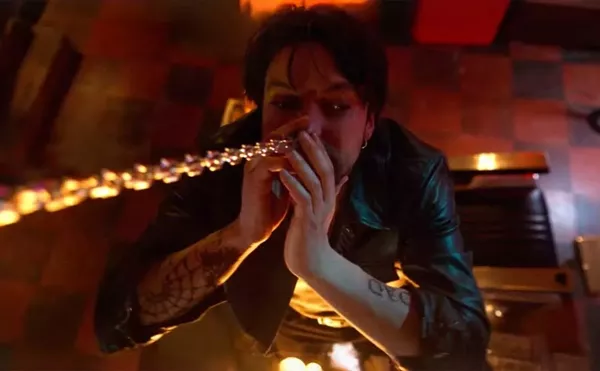
Audio By Carbonatix
[
{
"name": "GPT - Leaderboard - Inline - Content",
"component": "35519556",
"insertPoint": "5th",
"startingPoint": "3",
"requiredCountToDisplay": "3",
"maxInsertions": 100,
"adList": [
{
"adPreset": "LeaderboardInline"
}
]
}
]
It’s difficult to find a way to describe this modest Czech film without making it sound a little too cute. Fanda and his friend Ed are two old codgers, retired opera singers who never graduated from the chorus and who spend their days acting out harmless role-playing pranks. Some of these are brief improvised jokes, like pretending to be ticket inspectors in a subway station, and some are a little grander, as when Fanda pretends to be a visiting maestro from the New York Metropolitan Opera, looking to buy a mansion. Though Ed is a willing partner, Fanda seems to relish these real-life performances most.
But while he’s living a life of contented denial, heading toward his octogenarian years seemingly without a care, his wife Emilie is the exact opposite. Her main concern is that she save up enough money so that she and her husband can have decent funerals. Fanda is a lovable old scamp and Emilie is a party-pooping scold, so once again we have a film which posits that a life of fantasy makes you happy and attractive while those who keep their eye on reality become petty and uptight and difficult to be around — which is probably true as
often as it’s not.
The already-strained relationship between Fanda and Emilie reaches a critical point when a debt incurred from a backfired scheme leads him to steal some money from her funeral fund. Encouraged by their son Jara, whose dream is to see the two in a retirement home so he can have their apartment, Emilie decides to get a divorce. After 45 years, enough is enough.
What keeps all this from being cloying is a sensitivity that seems distinctly Eastern European, a streak of pessimistic resignation running just beneath the droll surface. Fanda is played by Vlastimil Brodsky, a veteran Czech actor who died shortly after filming. With his owlish demeanor and outsized ears, he seems like some sort of mischievous troll grown to human proportions. But there’s a lurking sadness beneath his blithe exterior, which emerges when Fanda tries to reform in order to save his marriage; the playfulness disappears and he seems like just another old duffer waiting to die. Despite a much too cuddly ending, Autumn Spring is upbeat in a complicated way, a story of perseverance told with humor but with a continual tug of seriousness, which prevents the narrative from floating into whimsy.
In Czech with English subtitles. Opening at the Maple Art Theatre (4135 W. Maple, west of Telegraph Road) Jan. 2 and playing for one week only. Call 248-263-2111 for show times.
Richard C. Walls writes about film for Metro Times. E-mail letters@metrotimes.com.





